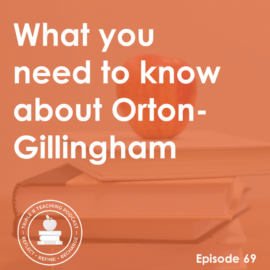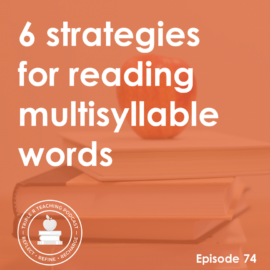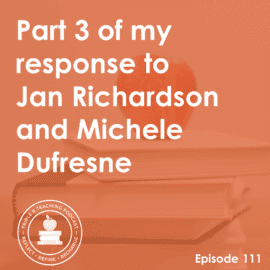
TRT Podcast#62: Reaction to Fountas & Pinnell #6 – You can teach phonics AND language comprehension
Fountas and Pinnell caution against focusing “only on accuracy and decoding.” If we do that, they say, students may not understand that what they read must make sense. But the science of reading community doesn’t advocate phonics alone. Far from it!
Listen to the episode here
Full episode transcript
Hello, Anna Geiger here! Welcome to Triple R Teaching, Episode 62. This is actually the sixth episode in our reaction series to Fountas & Pinnell.
So you know that Fountas and Pinnell are big literacy names in the United States, especially that they have created kind of an empire around their approach to teaching beginning reading instruction. They're the creators of the guided reading levels. They came out with their first book about guided reading back in the nineties and put out the second edition in 2017.
They have been holding fast to their beliefs about how beginning reading works, what materials we should use, and what approach we should take when teaching beginning readers. That has a lot of people in the science of reading community frustrated because it feels like Fountas and Pinnell aren't listening to what we've learned from research. They have, as one person said, "stuck their feet in concrete, and they're not budging."
They recently put out a "Just to Clarify" blog series, in which they answer ten questions or criticisms of their work. What we're doing in this series on my podcast is responding to each of those short audio blog posts that they have created.
Today we're going to look at question six and that was, "Could you speak to the role of phonics and teaching children to read, and clarify your approach to phonics instruction?"
Before I keep going I want to note that you might hear some coughing in the background, sorry about that. We've had a cold going through all my kids and I've had a kid home for a week at a time for several weeks. Right now it's my 11 year old and he's in another room working on some homework to catch up, but there's still some coughing coming in from over there. So hopefully you can ignore that and let's talk about phonics and Fountas and Pinnell.
As my kids would say, it's a little "sus" that Fountas and Pinnell are talking this much about phonics, because it's my understanding that it wasn't right away that they had this big portion of their program devoted to phonics. I'm pretty sure that was not part of the first version of their reading program at all. I've looked and looked to try to find dates for when all the pieces came out and I can't seem to find it. So I am ready to be corrected if I'm wrong, but I have to question any acknowledgement on their part that phonics is important if it wasn't something that came with the original program.
In a recent episode when I talked about guided reading and some of the problems with the way that Fountas and Pinnell use that, I talked about this big, fat book I have of theirs about guided reading. It's 600 pages, and it has fewer than five pages that even address phonics.
With early readers, phonics has got to be a huge piece of what we do with them, right? We need to build the phonemic awareness foundation and then teach phonics and teach them to decode words so that they have that first important piece when it comes to the Simple View of Reading.
Let's listen in to how Fountas & Pinnell answer the question about their beliefs regarding phonics: "Phonics is essential for reading and writing, and research certainly supports this, but phonics is not the end goal of literacy or becoming literate. An overarching principle in literacy learning is that the purpose of reading must be constructing the meaning of the text using language and print. When the focus is only on accuracy and decoding, young readers may not understand that the purpose of printed language is to make sense and to convey a meaningful message. They may give so much attention to decoding that they have little attention to give to thinking about the meaning, the language, and the messages of the text.
"In the pursuit of accurate reading, teachers must, of course, focus on helping children with decoding. But instruction must also include a focus on thinking within, about, and beyond the text. Therefore, an effective literacy design includes explicit phonics instruction and takes place within a comprehensive approach so that learners have ample opportunities to apply their understandings as they engage in meaningful reading and writing. The bottom line is, we believe there cannot be a one-size-fits-all approach to teaching phonics or phonemic awareness."
Okay, so let's take this apart. The very first thing that Irene Fountas says is, "Phonics is essential for reading and writing." We agree, right? Absolutely agree!
But then she adds a but, "But phonics is not the end goal of literacy or becoming literate." We can agree with that too, right? The goal of reading is reading comprehension, but as we learned with the Simple View of Reading, reading comprehension cannot occur without decoding and language comprehension.
She goes on to say that when the focus is only on accuracy and decoding, young readers may not understand the purpose of printed language is to make sense and to convey a meaningful message.
This is often the complaint lodged against science of reading advocates, that when you're so focused on phonics, kids aren't going to understand that the text is supposed to mean something. But you CAN do both and certainly if you take a look at Scarborough's Reading Rope, which shows us all the subskills involved in language comprehension and word recognition, you would know that the science of reading community is not at all against language comprehension. It's an important piece!
It's just that on the other side, the balanced literacy side, phonics has been notoriously unrepresented. It's often included, but in a haphazard way.
So this is a concern that the science of reading community has, therefore it can feel over-emphasized, but it is definitely not the end all and be all. I don't think anyone in the science of reading community would claim that to be the case.
In the second paragraph of her response, Fountas says that instruction must also include a focus on thinking within, about, and beyond the text. Agreed. Absolutely!
We do a lot of that in the science of reading structured literacy classrooms using interactive read alouds, which I know Fountas & Pinnell also promote. It's where the teacher reads a thoughtful piece of literature to the class and has planned places to stop and have discussions about vocabulary, using reading comprehension strategies, and so on. So we can agree on that.
I think the problem is that Fountas and Pinnell would believe that if you're using decodable books to teach reading, then you can't focus on comprehension. They might say that you can't help students realize that we're not just word calling, we're actually trying to make sense of the text. We addressed that in a previous episode, but I think it's worth repeating again here.
It really all comes down to the texts that you have students use, because Fountas and Pinnell can say all they want that phonics is important, that we need to teach phonics, and that we'll have these phonics lessons. But then if they're over here giving guided reading lessons with leveled books that do not allow students to practice the phonics knowledge that you've taught them, the students are not going to use it. They can't apply it because you're not giving them opportunities beyond lists of words in their phonics lessons.
I know this is really hard, but if you're trying to move from a balanced to structured literacy approach, you have to let go of this idea that teaching kids to sound out words teaches them to word call.
Now, could that happen? Could you have somebody who's just calling out words and not making any sense of it? Well, sure, but the problem isn't phonics, the problem is that they need some language comprehension instruction, whether that's background knowledge, vocabulary, or so on. Let's not blame phonics.
Let's remember that we teach phonics to help students identify the words, and we also teach language comprehension. We make sure that students have consistent opportunities to apply that phonics knowledge with the books they read and not practice three-queuing in leveled books.
I want to address one more thing in Fountas's response to this question and that's where she says the bottom line is that there cannot be a one-size-fits-all approach to teaching phonics or phonemic awareness.
So I agree with that. I don't think there's one program that works for everyone and the teacher is important here in this equation. Success with the program depends very much on the teacher's implementation and interaction with students and so on, which we will be getting to in another episode.
But I don't want to use this as a cop out. I wouldn't want to say, well, there's no one-size-fits-all approach, so you can use whatever you want. That's not true!
Now let's look in terms of what research says about phonics instruction and what it should be. Well, we know it should be systematic. We know it should be sequential. Some people say it should be synthetic. Synthetic phonics is when you sound out all the letters in a row, and there's also analytic phonics. I believe that analytic phonics is more where Fountas and Pinnell are coming from in their program. It's more word family based and more noticing the chunks of words. I'm not a hundred percent sure on that; I just know I've heard that from a couple of people.
So I think we can agree that there's no one program that serves everyone perfectly, but that doesn't mean that there aren't certain criteria we should look for when finding a good phonics program.
In the show notes I'm going to share with you an article by Wiley Blevins. He's a big name in the phonics community. I love his books, I think I have them all. He wrote something called, "Phonics: Ten Important Research Findings." I think that's really good to check out. It will help you consider the research as you're choosing your own phonics program. If I can find any other helpful posts from him, I'll also link to those in the show notes.
Thanks for listening to my reaction to Fountas and Pinnell's words on phonics. You can find the show notes for this episode at themeasuredmom.com/episode 62. See you next week.
Sign up to receive email updates
Enter your name and email address below and I'll send you periodic updates about the podcast.
Related resources
- Fountas & Pinnell’s series: Just to Clarify
- Emily Hanford’s response: Influential authors Fountas and Pinnell stand behind disproven reading theory
- Mark Seidenberg’s response: Clarity about Fountas and Pinnell
- Wiley Blevins: Phonics: 10 important phonics research findings
- Recommended book by Wiley Blevins: A Fresh Look at Phonics
- Free ebook from Sadlier Phonics (written by Wiley Blevins): Seven Characteristics of Strong Phonics Instruction







Alanna Martell
I am really appreciating all of these blog posts and resources. Can’t wait for the rest!
Anna Geiger
Thank you so much, Alanna! I really appreciate your feedback!